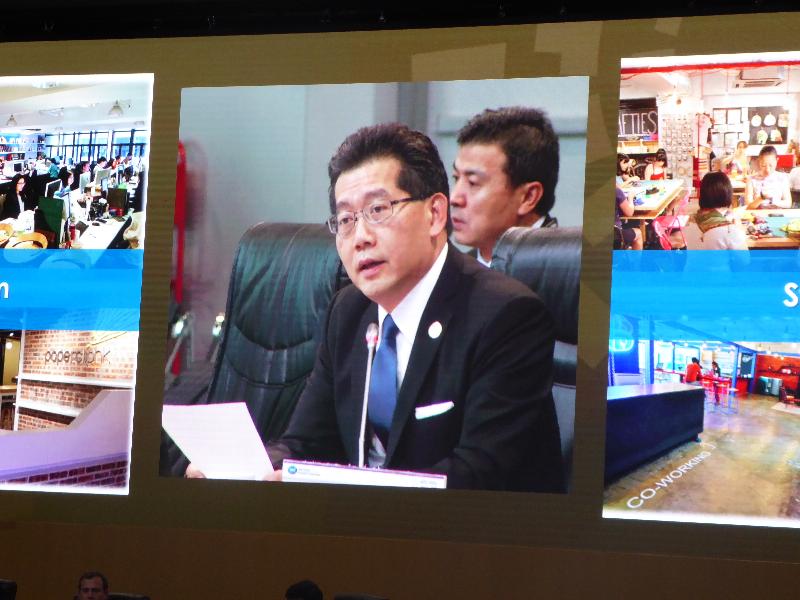Speech by SCED at 23rd APEC Small and Medium Enterprises Ministerial Meeting in Lima (English only) (with photo)
******************************************************************************************
Good afternoon, Mr Chairman, Ministers, Ladies and Gentlemen,
First of all, Hong Kong, China would like to join others in thanking Peru and the city of Lima for the warm hospitality and excellent arrangements for this Ministerial Meeting.
Today’s discussion of strengthening high impact SMEs through digital transformation is most timely. We all live in a digital economy. Many products, services and business processes are undergoing incredible transformation. The digital economy permeates the world in the form of e-commerce, e-learning, smart devices, social media platforms and so on. Emerging fields such as FinTech, the Internet of Things (IoT), Big Data Analytics have become key driving force behind the growth of many SMEs.
In fact, digital transformation is the major paradigm shift for different economic and social spheres, creating new growth opportunities for both public and private sectors. Many of my colleagues have shared about the programs aimed at helping SMEs in their countries. There are many similarities in these programs, of which Hong Kong, China, also shares. But I hope to in this intervention to share at a higher level our experience in this endeavor. From our perspective, to reap the full benefits thereof, the key is not to do this in isolation, but to smash through the confinement of traditional walls and seek collaboration from multiple disciplines. The three largest companies by market cap in the world are cases in point. Apple, Google and Microsoft all have such collaborative ecosystem, each of which spans multiple disciplines, crossing over personal computers, consumer electronics, information and communications and creative and entertainment sector. And one only needs to witness the phenomenal development of e-commerce made possible by players such as Alibaba which bring together a matrix of crossovers of various sectors, for the benefit and empowerment of SMEs.
In Hong Kong, China, we have observed a growing trend that different sectors are working together to explore crossover opportunities. Industries with complementary strengths choose to partner with one another to provide competitive products and services of value. For example, traditional manufacturers choose to crossover with IoT start-ups, our retailers choose to work with FinTech and e-commerce platforms, and movie and comics sectors choose to partner with mobile devices, toys manufacturers and fashion designers and so on. In doing so, they attract more customers, tap into new markets and create revenue streams for all sides. The possibilities know no bounds.
I recall the resounding remarks of Elon Musk, co-founder of Tesla, which best describe the situation we find ourselves in: "I could either watch it happen or be a part of it". Against this wave of new business mode and environment, I am pleased that my government is very much a part of it. We actively facilitate cross-industry business matching through meetings, seminars and proactive work of various departments with the missions to facilitate creative industry development and investment promotion. In many cases, the sectors need the assistance of the Government, with a wider or broader policy perspective, to bring industries together.
In this connection, we act swiftly to embrace the application of the latest digital technology. We just launched a pilot program on technology voucher with a total amount of 64 million US Dollars. The program subsidises SMEs to improve productivity and upgrade business processes through the use of technological services and solutions. The new modality of business inspires a new wave of entrpreneurship and a vibrant start-ups ecosystem. We will continue to offer comprehensive support to start-ups, in the form of incubation and accelerator programs, financing, business expansion and shared office space for co-creation.
It is important for APEC member economies not to be watching it happen but be a part of the process. If we believe that crossing over industries within an economy already reaps great benefits, think of what immense benefits we could harness together across economies. As I look around, I see the richness of our individual cultures, resources, skill sets and opportunities. This is a beautiful tapestry and a strong foundation for crossover and collaboration. I can see the opportunities for us to work together in every aspect to build a collaborative crossover platform for co-creation in this digital era, to harness the greatest synergistic value for all to share. I believe that my Korean colleague also referred to this important point of "global collaboration" in his intervention.
Looking forward, I am not advocating a prescriptive approach but a collaborative model. I am mindful of a quote from the author of the Little Prince, Antoine de Saint-Exupéry: "If you want to build a ship, don't drum up people to collect wood and don't assign them tasks and work, but rather teach them to long for the endless immensity of the sea." Indeed digital transformation is but a great vessel taking us collaboratively towards the vastness of economic opportunities and sustainable prosperity.
Thank you.
Ends/Saturday, September 10, 2016
Issued at HKT 8:23
Issued at HKT 8:23
NNNN



